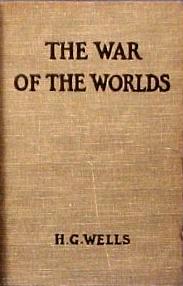War of the Worlds
|
1898 novel from book cover collection
|
Wells wrote a series of scientific romances in the 1890s, or as he called them, "fantasies of possibility." These were satires on complacent smug Victorian England. The Time Machine and The Island of Dr. Moreau and The War of the Worlds were warnings that peace and progress are not inevitable. These romances were not examples of fin de siecle pessimism in the last Victorian decade. Rather, they were about the future. He was influenced by the adventure fantasies of Jule Verne, particularly the cannon in From Earth to the Moon (1865) built to fire a projectile at the moon. In War of the Worlds, the Martian cylinders are fired from a cannon and crash into the British countryside. He was also influenced by the invasion scenes from George Chesney's 1871 novel The Battle of Dorking that conveyed a fear of the newly-unified Germany invading England. In War of the Worlds, the invaders are not Germans, but the future destroying the present. Just as England had invaded and colonized primitive cultures, the Martians plan to exterminate humans and use the earth for themselves. Wells wrote in his chapter 1, "The Tasmanians, in spite of their human likeness, were entirely swept out of existence in a war of extermination waged by European immigrants, in the space of fifty years. Are we such apostles of mercy as to complain if the Martians warred in the same spirit?" A great cylinder 30 yards diameter buries itself in the sand on Horsell Common near Woking where Wells was living as he wrote his novel. The people who surround the cylinder are a representation of Victorian classes. The octopus Martians that emerge breath with difficulty and drip saliva from their mouths (although Martians don't need mouths because they fed by blood transfusion and used telepathic communication). Ten giant cylinders land around Woking and London. The unnamed narrator is Wells himself, a scientist and writer living in Woking and learning to ride a bicycle. He is writing six years after the attack, but uses a journalistic style of an eyewitness account for a newspaper. The narrator's unnamed brother reports the mob panic in London. The Martians establish technological superiority with Heat-Rays and tripods (although three tripods are destroyed by human defenders) and a black poison gas. The beginning of Book 2 describes the Martians' superior evolution: "The perfection of mechanical appliances must ultimately supersede limbs, the perfection of chemical devices, digestion - that such organs as hair, external nose, teeth, ears, chin, were no longer essential parts of the human being, and that the tendency of natural selection would lie in the cirection of their steady diminution through the coming ages." However, the superior Martians are destroyed by germs, a victory of evolution. In Chapter 8 of Book 2, "These germs of disease have taken toll of humanity since the beginning of things - taken toll of our pre-human ancestors since life began here. But by virtue of this natural selection of our kind we have developed resisting-power; to no germs do we succumb without a struggle and to many - those that cause putrefactions in dead matter, for instance - our living frames are altogether immune. But there are no bacteria on Mars, and directly those invaders arrived, directly they drank and fed, our microscopic allies began to work their overthrow."
Sources:
- Batchelor, John. H. G. Wells. New York: Cambridge University Press, 1985. 176 p.
- Coren, Michael. The Invisible Man: the Life and Liberties of H. G. Wells. New York : Atheneum, 1993. 240 p.
- H. G. Wells Society
- Hammond, John. A Preface to H. G. Wells. New York : Longman, 2001. 225 p.
- Smith, David C. H. G. Wells: Desperately Mortal. New Haven: Yale University Press, 1986. 634 p.
- Smith, Don G. H.G. Wells on Film: the Utopian Nightmare. Jefferson, NC: McFarland, 2002. 197 p.
- H. G. Wells and War of the Worlds
